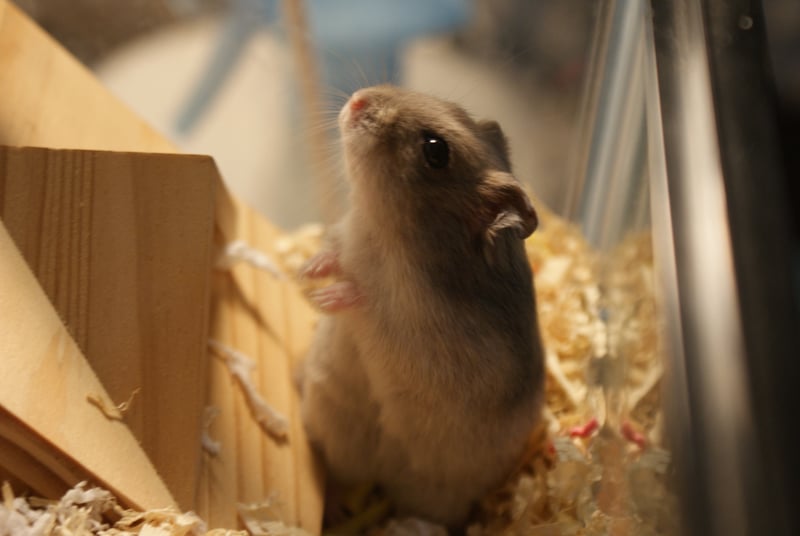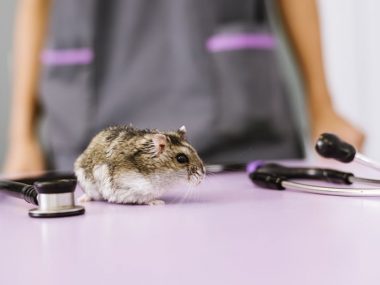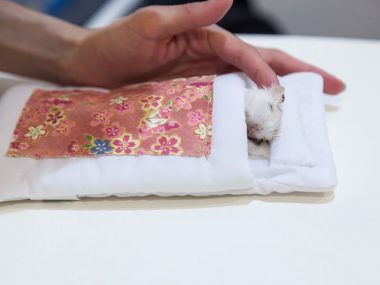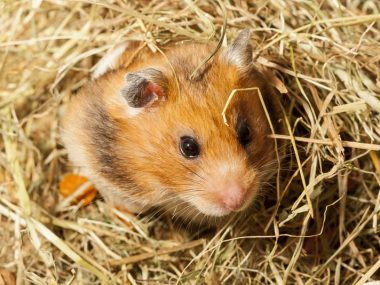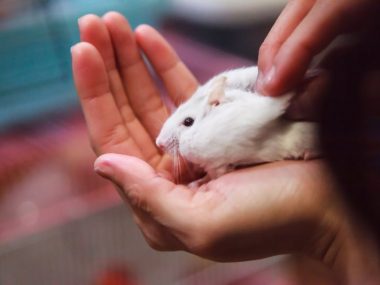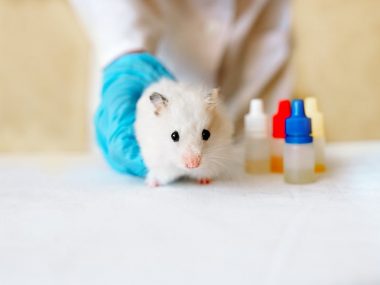Hamsters make excellent pets; they’re cute, furry, and can easily learn a few tricks every time you’re having fun with them. As a hamster owner, you’re concerned about showering them with love; but have you ever wondered whether your hamster likes you back? How can you tell whether your pet hamster is comfortable around you or not?
There are several hamster body language cues that your pet hamster demonstrates to show they like you as their parent. The most obvious sign they like you is if they don’t show any signs of tension around you. Hamsters can also stretch or yawn when they are comfortable with you.
In this article, I’ll show you, in detail, how to understand hamster body language so you can become a better pet parent in no time. Understanding your hamster’s body language will help you quickly notice when they are mad, angry, or unwell so you can adjust your care for them.
Table of Contents
Normal Hamster Behavior
Understanding hamster body language can be tough sometimes. Hamsters have unique traits that define them, so you shouldn’t worry when you notice these behaviors in them. Some of these habits include:
Being Active at Night
A hamster continually staying up and active at night is normal for any happy and healthy hamster. Hamsters are nocturnal animals and are more active at night and less active during the day.
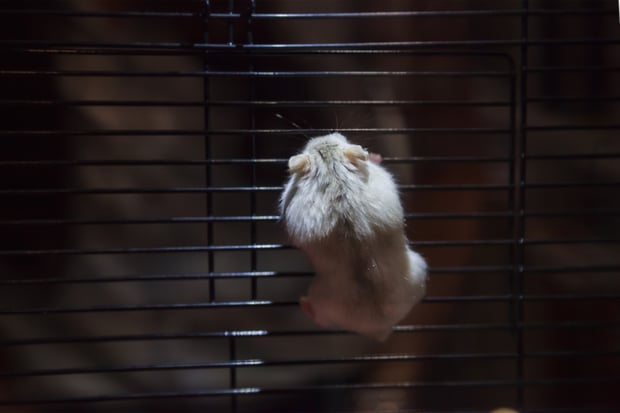
A Lot of Chewing
As a new hamster owner, you may fear there’s a problem when your hamster starts chewing on almost everything around. Hamsters tend to chew a lot to file and grind their teeth.
The front teeth of hamsters are constantly growing and, thus, need filing every day. To help them with their chewing addiction, you can get them a wooden block to chew on while also giving them crunchy meals.
Stuffing Their Cheeks
Hamsters stuffing their cheeks is a survival technique and, therefore, a typical behavior you shouldn’t fret about. Hamsters have to eat about every two hours to grow healthy and survive, and at times, they tend to store their food by stuffing it in their cheeks for future use.
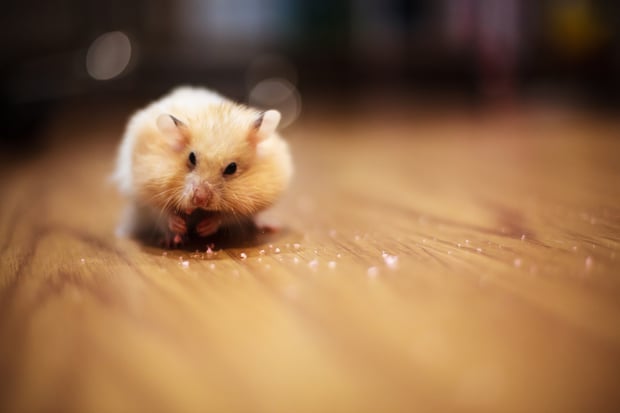
Some hamsters can carry up to 50% of their body weight in their cheeks. So you shouldn’t be surprised when a mother hamster stuffs her babies in her mouth to protect them.
Burrowing and Hiding
If your hamster is hiding himself away in his cage, this is completely normal behavior. They do this as a protection mechanism, and it is part of their instinct to stash themselves away in a hiding place. Your hamster may be looking to rest and will hide to feel safer.
These instinctual behaviors differ from other hamster breeds, which explains why the Syrian hamster’s body language differs from other breeds. They are more anxious, like living alone, and often burrow for safety.
Abnormal Hamster Behavior
Your pet hamster will not always exhibit the normal behaviors you expect. The body language of a stressed hamster will inevitably differ from that of a happy hamster. When they’re sick, hungry, or uncomfortable, they’ll exhibit abnormal behaviors like the ones I’ve listed below.
Hibernating
Although all hamsters hibernate, this is only expected for wild hamsters. When a pet hamster hibernates, it could be a tell-a-tale sign that the room temperatures are too low for them. To keep a healthy hamster, the habitat should be at average household temperatures of up to 80°F (26.7°C).
Circling and Twirling
If you notice your hamster going around in circles, it could be they’re suffering from a brain injury or an ear infection. If the behavior just started, it could be an ear infection, but if your pet hurt itself when younger, it might have had a brain condition since its early days. It would be best to get them to a veterinarian as soon as possible.
Severe Scratching
If your hamster is constantly scratching itself, especially to the point of drawing blood, it could have health concerns such as mites or mange. If your pet exhibits this behavior, I recommend checking with a vet to establish the cause.
Not Eating or Drinking
Healthy hamsters eat almost constantly. So, if your hamster isn’t eating or drinking, it’s a clear sign they’re having health problems. It’s best to get them checked as soon as possible, as prolonged hunger could lead to dehydration and exhaustion.
Hamster Behaviors and What They Mean
By observing them, you can tell the body language of a stressed hamster from one that is happy. Here are a few hamster behaviors that can help you better understand and care for your fur baby.
Yawning and Stretching
A hamster that yawns and stretches every time you come close is a good sign and means that your hamster feels safe in your presence. If they feel safe enough to feel vulnerable around you, then you are certainly doing something right.
Additionally, if you are holding your hamster and he stretches or yawns, this is even more proof that he feels comfortable around you.
Watching You With Its Ears Erect
When a hamster is watching you, it’s probably curious about what is happening. When hamsters are curious, they stand on their hind legs and wave their front paws around a little with their ears erect. Because hamsters have poor eyesight, they rely on their other senses like touch, taste, and smell to become used to and explore their surroundings.
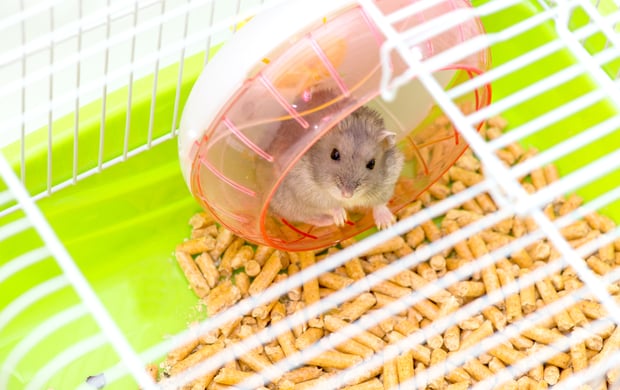
However, watchfulness can sometimes lead to aggression, leading to a bite or a little nip when you try to touch them. It’s advisable to avoid holding or touching your hamster when it is being watchful of you.
Empties Its Cheeks Quickly
If your hamster was going about its day stuffing its cheeks then suddenly stops and empties them, there might be a problem. This is a clear indicator that it doesn’t feel safe at that moment and will probably run and hide.
At this point, it’s probably a good idea to let them hide in peace and check on them a bit later.
Allows You To Pet Them
When your hamster shows no signs of restlessness when you try to pet it, it means they like you and are very comfortable with you. Some may even fall asleep in your arms when petting them. However, this doesn’t mean that your pet hamster doesn’t like you at all if they struggle when you try petting them.
Biting and Nibbling
When hamsters are afraid, anxious, or bewildered, they tend to bite a lot. If your hamster attacks you, there’s a good chance it’s for a reason. Sometimes, they will nibble your hand or even bite when you aren’t holding them right. It would help to understand what makes them react and fix it to avoid hamster attacks.
Grooming
Hamsters devote a significant portion of their time to grooming. When a hamster grooms itself by washing its feet, hands, and fur, it indicates that it is secure and content in its environment.
If your hamster is grooming himself around you, it is yet another indication that he feels comfortable in your presence.
Gnawing on its Cage Bars
This may be a sign that your hamster wants a little attention. You can take it out of the cage and give it toys to keep it entertained and happy. You should aim to let your hamster roam freely outside of the cage at least once a day. This is essential exercise that your hamster needs in order to maintain good health.
Running
It’s usually a good sign of happiness and contentment when your hamster runs around in its cage. This is a typical dwarf hamster‘s body language because of its energetic behavior. You should be careful when holding it because it tends to jump off.
However, a hamster’s hyperactivity or repetitive behavior may show that they are not well mentally. It may be that its cage is too small and you need to get a bigger one, or it doesn’t have enough chewing and playing toys to keep them entertained in different ways.
Freezes in Place
Hamsters freeze or play dead when they feel threatened and unsafe. Check around for the causes of this reaction and neutralize the threat. If your hamster is freezing because you are in the room, quietly leave and return later. It is best not to disturb them if they display any fear or anxiety in this manner.
Frequently Asked Questions
How Do You Tell if Your Hamster Is Comfortable With You?
You can tell if your hamster is comfortable with you when they are calm around you and allow you to pet them or hold them without struggling or biting. They are also comfortable if they keep playing when you are watching them.
Why Does My Hamster Stare at Me?
Your hamster can stare at you when startled or frightened. They get watchful when they are unsure of their surroundings or react. It would be best if you kept a distance to let them relax.
How Do Hamsters Show Affection?
Hamsters show affection by striving for your attention. They may come closer to let you touch them or sprint towards you when you walk into the room. That means the little guy loves having you around.
Do Hamsters Like It When You Talk to Them?
Hamsters recognize their owners by their voice and scent and thrive on human interaction. So yes, hamsters like it when you talk to them. Just make sure you speak slowly and softly not to scare them away.
Why Do Hamsters Lick You?
While hamsters may lick you to indicate affection, they may be suffering from a salt deficit if they lick you excessively. It would help if you considered switching their diet to something with more salt.
Why Do Hamsters Nibble You?
Hamsters nibble you when they are afraid or not handled properly. Try holding them in a supportive way and make them more comfortable to avoid nibbling or even biting.
Conclusion
Paying close attention to your hamster when they are alone or when playing with them will allow you to recognize when they are acting differently. Hamsters don’t show signs of illness unless they are very sick. Understanding their normal and abnormal behavior will help you identify these signs before it’s too late.
Sometimes their body language can show you whether you have created trust with them and how much they love you. As a new hamster owner, don’t stress about it or force them when they aren’t comfortable. They’ll come around naturally as long as you are patient and caring.
